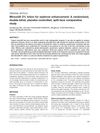 66 citations,
June 2013 in “Journal of Dermatological Treatment”
66 citations,
June 2013 in “Journal of Dermatological Treatment” Finasteride and dutasteride effectively treat hair loss, but may cause side effects like sexual dysfunction and depression.
 48 citations,
November 2017 in “Journal of the American Academy of Dermatology”
48 citations,
November 2017 in “Journal of the American Academy of Dermatology” Tofacitinib 2% ointment helped hair regrow in 3 out of 10 patients with alopecia areata, but caused side effects like scalp irritation and raised cholesterol in some.
 33 citations,
July 2020 in “Journal of The American Academy of Dermatology”
33 citations,
July 2020 in “Journal of The American Academy of Dermatology” PRP treatment improves hair density and thickness for alopecia, but needs more research.
 32 citations,
February 2016 in “Journal of Dermatology”
32 citations,
February 2016 in “Journal of Dermatology” Dutasteride safely promotes hair growth and reduces hair loss, with mild side effects.
 26 citations,
October 2020 in “Pediatric Dermatology”
26 citations,
October 2020 in “Pediatric Dermatology” Oral tofacitinib may effectively treat hair loss in children with alopecia areata.
 20 citations,
January 2017 in “Actas Dermo-Sifiliográficas”
20 citations,
January 2017 in “Actas Dermo-Sifiliográficas” Recent advances in hair loss treatments show significant progress.
 16 citations,
June 2021 in “Journal of Dermatological Treatment”
16 citations,
June 2021 in “Journal of Dermatological Treatment” Minoxidil effectively treats hair loss, especially androgenetic alopecia, but needs more research for better understanding.
 15 citations,
January 2018 in “Acta dermato-venereologica”
15 citations,
January 2018 in “Acta dermato-venereologica” Finasteride and dutasteride increase sexual dysfunction risk by 1.57 times in male hair loss treatment.
 13 citations,
November 2013 in “The Journal of Dermatology”
13 citations,
November 2013 in “The Journal of Dermatology” Minoxidil 2% lotion is safe and effective for making eyebrows thicker and fuller.
 12 citations,
August 2019 in “Dermatitis”
12 citations,
August 2019 in “Dermatitis” Dupilumab for skin problems might reactivate hair loss in some patients.
 7 citations,
March 2017 in “Actas Dermo-Sifiliográficas”
7 citations,
March 2017 in “Actas Dermo-Sifiliográficas” Several new treatments for different types of hair loss show promise in improving patient quality of life.
5 citations,
May 2018 in “Therapeutic advances in drug safety” Androgen use may increase the risk of stroke, but more research is needed.
 2 citations,
October 2015 in “Human Gene Therapy”
2 citations,
October 2015 in “Human Gene Therapy” The congress highlighted new gene therapy techniques and cell transplantation methods for treating diseases.
 1 citations,
June 2023 in “Radiation oncology journal”
1 citations,
June 2023 in “Radiation oncology journal” Low-dose radiation therapy may improve brain function in some Alzheimer's patients and is generally well-tolerated.
 June 2024 in “Dermatology and therapy”
June 2024 in “Dermatology and therapy” Intramuscular injections improved hair density more than intradermal injections for treating hair loss.
 February 2024 in “PloS one”
February 2024 in “PloS one” Tofacitinib and adalimumab are promising treatments for cicatricial alopecia with few side effects.
 149 citations,
June 2002 in “Veterinary record/The veterinary record”
149 citations,
June 2002 in “Veterinary record/The veterinary record” Trilostane effectively improved symptoms in dogs with a certain adrenal gland disorder.
 121 citations,
May 2009 in “Journal of Ethnopharmacology”
121 citations,
May 2009 in “Journal of Ethnopharmacology” Eclipta alba extract may help hair grow similarly to Minoxidil.
 78 citations,
October 2020 in “Experimental Dermatology”
78 citations,
October 2020 in “Experimental Dermatology” Hidradenitis suppurativa is caused by genetic factors, inflammation, bacteria, hormones, and lifestyle factors like obesity and smoking.
 63 citations,
January 2012 in “The European Journal of Contraception & Reproductive Health Care”
63 citations,
January 2012 in “The European Journal of Contraception & Reproductive Health Care” Some birth control pills have a higher risk of blood clots than others.
 61 citations,
January 2015 in “Hormones”
61 citations,
January 2015 in “Hormones” Liraglutide caused significant weight loss in some obese women with PCOS, especially those with severe obesity and insulin resistance.
 57 citations,
May 2016 in “Journal of Dermatological Treatment”
57 citations,
May 2016 in “Journal of Dermatological Treatment” PRP therapy may effectively treat hair loss, but more research needed.
 54 citations,
May 2018 in “Journal of The European Academy of Dermatology and Venereology”
54 citations,
May 2018 in “Journal of The European Academy of Dermatology and Venereology” Low level laser therapy works best for hair loss, followed by PRP, finasteride, and minoxidil.
 26 citations,
April 2019 in “Journal of Cosmetic Dermatology”
26 citations,
April 2019 in “Journal of Cosmetic Dermatology” Herbal alternatives like saw palmetto and green tea may offer safe, effective treatment for hormonal hair loss.
 26 citations,
October 2016 in “Clinics in Dermatology”
26 citations,
October 2016 in “Clinics in Dermatology” Hormonal treatments can improve acne, but they come with potential side effects and risks.
 15 citations,
July 2019 in “Journal of Investigative Dermatology”
15 citations,
July 2019 in “Journal of Investigative Dermatology” CBD can either reduce inflammation and not affect hair growth at low levels or inhibit hair growth at high levels.
 7 citations,
December 2020 in “Dermatologic Therapy”
7 citations,
December 2020 in “Dermatologic Therapy” Injections with 0.5% minoxidil effectively treat female hair loss, increasing hair density and thickness.
 6 citations,
September 2019 in “Skin pharmacology and physiology”
6 citations,
September 2019 in “Skin pharmacology and physiology” RCS-01 therapy is safe and may improve skin structure by affecting gene expression.
 January 2024 in “Journal of neurogastroenterology and motility”
January 2024 in “Journal of neurogastroenterology and motility” Quadruple-coated probiotics significantly improve IBS symptoms.
 2 citations,
October 2022 in “Journal of Biomedical Science”
2 citations,
October 2022 in “Journal of Biomedical Science” Stem cells and their secretions could potentially treat stress-induced hair loss, but more human trials are needed.




























